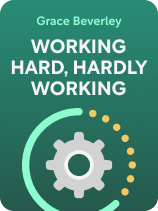

This article is an excerpt from the Shortform book guide to "Working Hard, Hardly Working" by Grace Beverley. Shortform has the world's best summaries and analyses of books you should be reading.
Like this article? Sign up for a free trial here.
Do you feel like you want to retire, but you’re only 30? Is work a nonstop reality in your life?
Grace Beverley addresses today’s epidemic of burnout in her book Working Hard, Hardly Working. She points to three realities behind it: our culture of overwork, continuous access to technology, and economic uncertainty.
Read more to learn what causes burnout at work in today’s world.
What Causes Burnout at Work?
According to Beverley, many Gen Zers and Millennials are burned out. (Shortform note: Some research supports Beverley’s claim: For instance, a 2023 poll that surveyed desk-based workers found that Gen Zers and Millennials [specifically young Millennials] reported higher rates of burnout than older generations did. However, burnout rates vary by profession. For example, one report reveals that Gen X physicians experience higher rates of burnout than their younger colleagues. This suggests that Beverley’s insights on burnout and how to overcome it may be relevant to some members of older generations, too.)
So, what causes burnout at work? Beverley argues that three features of life today contribute to the problem of burnout among young people in particular.
#1: Our Culture of Overwork
Beverley says that our culture of overwork—which frames productivity as a measure of your value—pressures young people to constantly earn money with “side gigs” instead of enjoying their downtime. For instance, someone who enjoys crafting in their free time might feel like they should start selling everything they make on Etsy.
(Shortform note: Side gigs have both pros and cons. In Keep Going, Austin Kleon warns that side gigs specifically involving creative work transform hobbies that typically relieve stress into obligations that increase stress. Some psychologists agree, adding that a side gig can harm your relationships by depriving you of the free time you’d otherwise spend with loved ones. By contrast, side gigs may benefit you by increasing your access to people who share your interests and equipping you with skills that can boost your career.)
#2: Continuous Access to Technology and Social Media
Today, people have continuous access to technology. According to Beverley, this contributes to our culture of overwork and subsequent burnout in two main ways. First, continuous access to laptops and phones makes it possible and tempting to work during time off.
(Shortform note: While you may have continuous access to your laptop and phone, some experts say you can reduce your temptation to access those devices’ work-related features. For instance, consider setting an auto-reply message while you’re on vacation and turning off email notifications on your phone during non-work hours.)
Second, social media platforms that are popular among Gen Zers and Millennials glorify overworking. Our culture of overwork proliferates on platforms such as TikTok and Instagram. People flaunt their productivity and accomplishments in their posts, contributing to the belief that it’s normal and noble to overwork. Because social media is accessible 24/7, young people have a hard time escaping our culture of overwork and its messages about productivity.
(Shortform note: Young people may struggle to escape social media’s culture of working not only because these platforms are accessible 24/7, but because they’re specifically addictive. In Dopamine Detox, Thibaut Meurisse explains why. When you anticipate receiving likes and positive comments while using platforms like TikTok and Instagram, the reward centers in your brain release dopamine, a neurotransmitter that motivates you to seek out pleasure. Your brain then associates scrolling on these platforms with this pleasure, making you addicted to it.)
#3: Economic Uncertainty
Beverley argues that economic uncertainty makes Gen Zers and Millennials feel like they need to constantly work so they can make enough to feel financially secure. She notes that recent events, such as the Covid-19 pandemic, have contributed to this economic uncertainty.
(Shortform note: Some experts agree with Beverley that economic uncertainty and the Covid-19 pandemic play a role in these high rates of burnout among people under 30. They add that women also experience a high risk of burnout for the same reasons as young people.)
| The Origins and Spread of Our Culture of Overwork In Do Nothing, journalist Celeste Headlee traces the origins of our culture of overwork back to the Industrial Revolution, the period of rapid technological advancement in Europe and the US that began in the 1700s. Prior to the Industrial Revolution, many people worked in farming or trades such as carpentry where they had control over their schedules and earnings. Then, during the Industrial Era, factory owners reduced farmers’ access to land and mass-produced products that made people’s trades less lucrative. Former farmers and tradespeople moved to cities to find work in factories. In these jobs, they earned low wages so factories could maximize their profits. They also had to work longer hours (10-14 hours) to meet their basic needs. At the turn of the 20th century, labor unions pressured employers to improve working conditions—for instance, by demanding shorter work days. Following this, employers changed their tactics for maximizing profits. For example, they started motivating employees to work harder by offering them promotions. This led workers to compete more with one another, work longer hours, and produce more. These employer tactics, and employees’ tendency to overwork themselves, persist today. Although the Industrial Revolution primarily took place in Europe and the US, some say the economic changes it brought about were global: Most countries transitioned from an economy based on farming to one based on manufacturing. Some recent data suggest that today, people in regions outside Europe and the US may be even more overworked. For instance, one study found that people have the highest risk of health problems from overwork in Southeast Asia and the Western Pacific, while people in Europe have the lowest risk. |

———End of Preview———
Like what you just read? Read the rest of the world's best book summary and analysis of Grace Beverley's "Working Hard, Hardly Working" at Shortform.
Here's what you'll find in our full Working Hard, Hardly Working summary:
- Why self-care and productivity require one another
- How to use your work time wisely and make work tasks more enjoyable
- How regular self-care can help you prevent burnout






